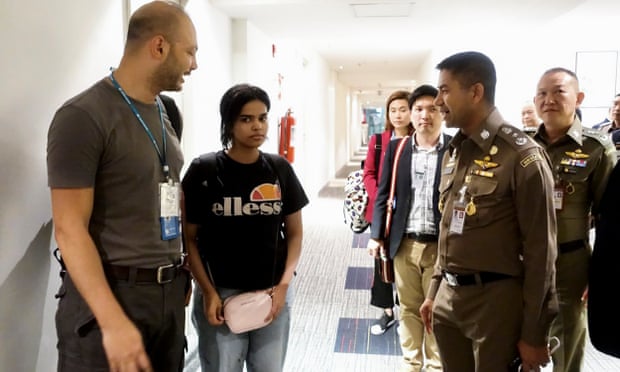Helen Davidson
Thai authorities say 18-year-old will not be forced to return with her father to the Middle East, where she claims her family will kill herAn 18-year-old Saudi woman who barricaded herself in a Bangkok airport hotel room to prevent her forcible return to a family she claims will kill her, has been taken under the protection of the UN high commissioner for refugees in Thailand.
The Australian government said on Monday night Rahaf Mohammed al-Qunun’s situation was “deeply concerning” and it had lobbied the Thai government and the UNHCR to allow her to formally claim asylum.
She demanded access to the UNHCR and barricaded herself inside her hotel room in fear she would be forced on to a plane after Kuwait Airways officials had come to her door, but Monday’s 11.15am flight departed without her.
Qunun was detained on arrival at Bangkok and denied entry to Thailand while en route to Australia, where she said she intended to seek asylum. The Guardian confirmed on Monday Qunun had a valid three-month tourist visa for Australia, issued to her Saudi passport. Qunun said she was abducted after arriving in Bangkok and had her passport confiscated by Saudi Arabian diplomatic staff.
The head of Thailand’s immigration police, General Surachate Hakparn, had previously said Qunun would be sent back to Saudi Arabia because she was “unsafe” without a guardian in Thailand, and claimed she did not have the documentation to go on to Australia.
But late on Monday he promised she would not be deported and agreed to consult the UNCHR. He later said she had been taken to a safe house for her asylum claim to be processed.
“If she goes home it will be dangerous for her so Thailand is ready to help,” he told media. “We are working with the foreign affairs ministry and UNHCR and today we will allow her entry to Thailand. UNHCR is now taking care of her and working on her asylum claim.”
Surachate said Qunun’s father was due to arrive in Bangkok on Monday night and that officials would establish whether she wanted to return to the Middle East with him. “As of now, she does not wish to go back and we will not force her. She won’t be sent anywhere tonight,” he told reporters. “Thailand is a land of smiles. We will not send anyone to die.”
Qunun confirmed on Twitter she was under the protection of the UNHCR and her passport had been returned.
A spokeswoman for the UNHCR, Melissa Fleming, confirmed the organisation’s Bangkok protection team was meeting Qunun. “UNHCR has been following developments closely and immediately sought access from the Thai authorities to meet with Rahaf to assess her need for international protection,” she said. “UNHCR consistently advocates that refugees and asylum seekers – having been confirmed or claimed to be in need of international protection – cannot be returned to their country of origin according to the principle of non-refoulement.” She said the UNHCR could not comment on the outcome of the meeting, for confidentiality reasons.
The Australian Department of Foreign Affairs said it was monitoring the case closely.
“The claims made by Ms Al-Qunun that she may be harmed if returned to Saudi Arabia are deeply concerning,” a spokesman said on Monday night.
“The Australian embassy in Thailand has made representations to both the Thai government and the Bangkok office of the UNHCR to seek assurances that Ms Al-Qunun can access the UNHCR’s refugee status determination process in Thailand.”
Qunun said in a video posted on social media from inside the airport that she was trying to escape from her family because they subjected her to physical and psychological abuse. She has appealed for help from Europe, the US, Canada and Australia.
“I am Rahaf … I am in the hotel, I need a country to protect me as soon as possible. I am seeking asylum,” said Qunun, who fled Kuwait while her family was visiting the Gulf country. “My family is strict and locked me in a room for six months just for cutting my hair,” she said, adding that she was certain she would be imprisoned if sent back. “I’m sure, 100%, they will kill me as soon as I get out of the Saudi jail,” she said.
Her case has brought international attention to the obstacles women face in Saudi Arabia. The kingdom also faces intense scrutiny over the murder of journalist Jamal Khashoggi, which has renewed criticism of its human rights record.A 20-year-old friend of Qunun, whom the Guardian has chosen not to name and who recently moved from Saudi Arabia to Australia, said the threats to her were real. “She’s ex-Muslim and has a very strict family. They’re using violence with her and she faced sexual harassment,” she said. “She received a threat from her cousin – he said he wants to see her blood, he wants to kill her.
“If they didn’t kill her they couldn’t go [around in] public after this [Qunun renouncing the Muslim faith], so they have to do it,” the friend said. “It’s like: if you’re a man you should prove it. If they don’t kill her they can’t go outside and see other men.”
Qunun’s friend has lived in Australia for three months, and said she was seeking asylum there after being abused in Saudi Arabia. She said she had known Qunun for a year, after connecting with her online. “She’s an activist, she’s a feminist,” she said. Sarah Hanson-Young, a Greens senator from South Australia, called on Australia to act quickly to issue Qunun with emergency travel documents.


No comments:
Post a Comment